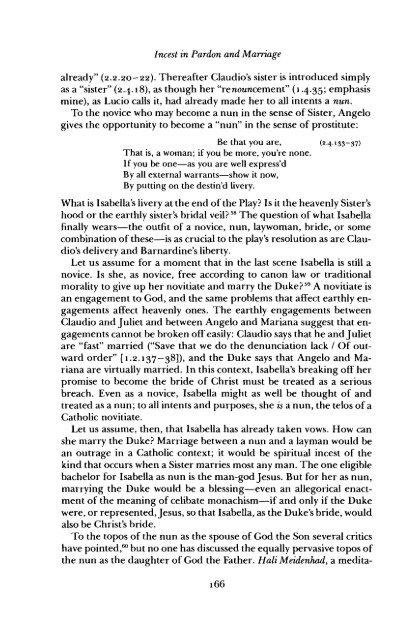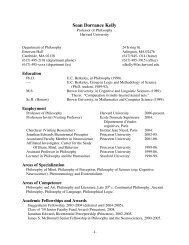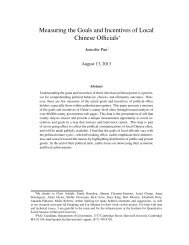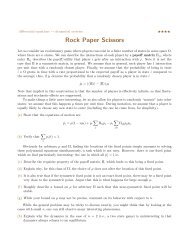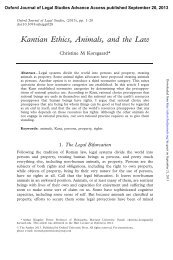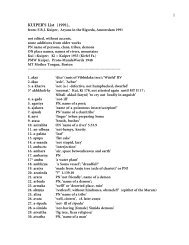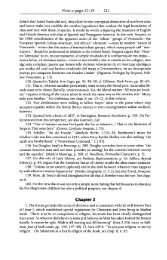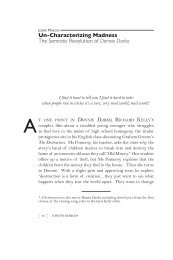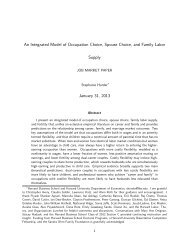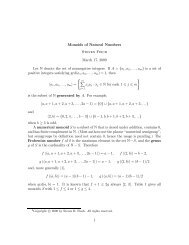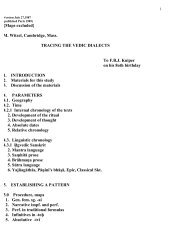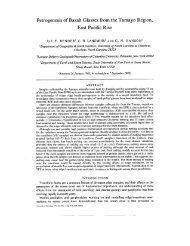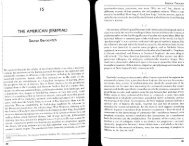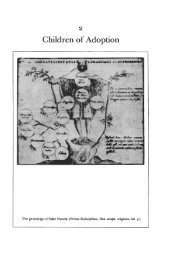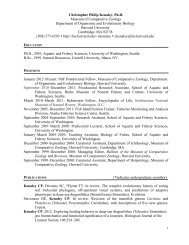Incest in Pardon and Marriage - People Fas Harvard
Incest in Pardon and Marriage - People Fas Harvard
Incest in Pardon and Marriage - People Fas Harvard
You also want an ePaper? Increase the reach of your titles
YUMPU automatically turns print PDFs into web optimized ePapers that Google loves.
<strong>Incest</strong> <strong>in</strong> <strong>Pardon</strong> <strong>and</strong> <strong>Marriage</strong><br />
already" (2.2.20-22). Thereafter Claudia's sister is <strong>in</strong>troduced simply<br />
as a "sister" (2.4. I 8), as though her "renouncement" (I .4.35; emphasis<br />
m<strong>in</strong>e), as Lucio calls it, had already made her to all <strong>in</strong>tents a nun.<br />
To the novice who may become a nun <strong>in</strong> the sense of Sister, Angelo<br />
gives the opportunity to become a "nun" <strong>in</strong> the sense of prostitute:<br />
Be that you are, (2.4.133-37)<br />
That is, a woman; if you be more, you're none.<br />
If you be one-as you are well express'd<br />
By all external warrants-show it now,<br />
By putt<strong>in</strong>g on the dest<strong>in</strong>'d livery.<br />
What is Isabella's livery at the end of the Play? Is it the heavenly Sister's<br />
hood or the earthly sister's bridal veil? The question of what Isabella<br />
f<strong>in</strong>ally wears-the outfit of a novice, nun, laywoman, bride, or some<br />
comb<strong>in</strong>ation of these-is as crucial to the play's resolution as are Claudio's<br />
delivery <strong>and</strong> Barnard<strong>in</strong>e's liberty.<br />
Let us assume for a moment that <strong>in</strong> the last scene Isabella is still a<br />
novice. Is she, as novice, free accord<strong>in</strong>g to canon law or traditional<br />
morality to give up her novitiate <strong>and</strong> marry the Duke?5g A novitiate is<br />
an engagement to God, <strong>and</strong> the same problems that affect earthly engagements<br />
affect heavenly ones. The earthly engagements between<br />
Claudio <strong>and</strong> Juliet <strong>and</strong> between Angelo <strong>and</strong> Mariana suggest that engagements<br />
cannot be broken off easily: Claudio says that he <strong>and</strong> Juliet<br />
are "fast" married ("Save that we do the denunciation lack 1 Of outward<br />
order" [1.2.137--38]), <strong>and</strong> the Duke says that Angelo <strong>and</strong> Mariana<br />
are virtually married. In this context, Isabella's break<strong>in</strong>g off her<br />
promise to become the bride of Christ must be treated as a serious<br />
breach. Even as a novice, Isabella might as well be thought of <strong>and</strong><br />
treated as a nun; to all <strong>in</strong>tents <strong>and</strong> purposes, she is a nun, the telos of a<br />
Catholic novitiate.<br />
Let us assume, then, that Isabella has already taken vows. How can<br />
she marry the Duke? <strong>Marriage</strong> between a nun <strong>and</strong> a layman would be<br />
an outrage <strong>in</strong> a Catholic context; it would be spiritual <strong>in</strong>cest of the<br />
k<strong>in</strong>d that occurs when a Sister marries most any man. The one eligible<br />
bachelor for Isabella as nun is the man-god Jesus. But for her as nun,<br />
marry<strong>in</strong>g the Duke would be a bless<strong>in</strong>g-even an allegorical enactment<br />
of the mean<strong>in</strong>g of celibate monachism-if <strong>and</strong> only if the Duke<br />
were, or represented, Jesus, so that Isabella, as the Duke's bride, would<br />
also be Christ's bride.<br />
To the topos of the nun as the spouse of God the Son several critics<br />
have po<strong>in</strong>ted,'jO but no one has discussed the equally pervasive topos of<br />
the nun as the daughter of God the Father. Hali Meidenhad, a medita-


